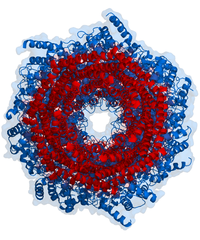
Photo from wikipedia
The proteasome is a central regulator of protein homeostasis in all eukaryotes. Targeted pharmaceutical inhibition of the proteasome complex has been implemented as a successful therapeutic strategy to treat several… Click to show full abstract
The proteasome is a central regulator of protein homeostasis in all eukaryotes. Targeted pharmaceutical inhibition of the proteasome complex has been implemented as a successful therapeutic strategy to treat several cancers including multiple myeloma. Unfortunately, many of the cancers show intrinsic resistance to proteasome inhibitors, and those that are initially responsive eventually develop resistance by a poorly understood mechanism. We have recently performed genome-wide screens for mutations that allowed cells to survive in the presence of two distinct proteasome inhibitors (bortezomib and MG132). Counter to expectation, we have shown that reducing any one of the many of the subunits of the regulatory cap complex (19S) is sufficient to alter both the levels and ratio of the 26S/20S proteasome complex and induce increased resistance to proteasome inhibition. These findings motivated us to establish a cell-based screening strategy to identify molecules that specifically target the proteasome inhibitor (PI)-resistant state. We further exploited the Genomics of Drug Sensitivity in Cancer (GDSC) database to analyze the efficacy of PIs across 315 cancer cell lines for which we also had matched gene expression data. This analysis revealed that a significant decrease in the gene expression of one component of the 19S complex is both naturally occurring (in almost 6-8% of cells examined) and is sufficient to predict resistance to PIs. We termed these cells, proteasome HYDRA (Hypo expression Yielding Drug Resistance Ability) cancer cells. Further exploring the HYDRA cells utilizing the Cancer Cell Line Encyclopedia (CCLE) dataset revealed that the loss of expression of the proteasome subunit is not associated with a loss of gene copy number but rather is an epigenetic mechanism of reduced gene expression. We show here a novel cellular epigenetic switch utilized by many cancer cells that renders them resistant to proteotoxic stress. Our findings enable prediction of cancer cell vulnerability to proteasome function perturbation and also facilitate the specific targeting of this unique epigenetic state by selective drug treatment. Citation Format: Peter Tsvetkov, Ethan Sokol, Dexter Jin, Piyush Gupta, Sandro Santagata, Luke Whitesell, Susan Lindquist. Targeting the epigenetic state regulating cancer cell vulnerability to proteasome inhibition. [abstract]. In: Proceedings of the AACR Precision Medicine Series: Targeting the Vulnerabilities of Cancer; May 16-19, 2016; Miami, FL. Philadelphia (PA): AACR; Clin Cancer Res 2017;23(1_Suppl):Abstract nr A28.
Journal Title: Clinical Cancer Research
Year Published: 2017
Link to full text (if available)
Share on Social Media: Sign Up to like & get
recommendations!